Brain food is a hot topic these days. There are many ways to boost the brain, but none is as important as feeding it the right food and nutrients. The link between proper diet and optimum mental performance is widely documented. By comparison, poor eating consistently shows a negative impact on all functions of the mind.
With the right diet, you can stay fit and sharpen your mental focus at the same time. Brain foods are healthful eats that keep the body strong and also power up your neurons.
Here, we explain the critical role of diet and nutrition in brain health, round up the best and worst foods for mental focus, and help you formulate a brain food diet plan.
Quicklinks:
- How Does Good Nutrition Boost Your Mental Performance?
- What Is the Best Diet for Sharpening Mental Focus?
- What Foods Can Make the Brain Sluggish?
- How Should You Make A Brain Food Diet Plan?
- What Else Can Boost Mental Performance Besides the Best Brain Diet?
- Conclusion
How Does Good Nutrition Boost Your Mental Performance?
The old expression "You are what you eat" sums up food's effects on the body. Feeding it trash makes you constantly feeling sick and energy-drained. Giving it the proper nutrients peps you up and gets you ready for any challenge.
In the brain, food directly influences how you think and interact with your environment. You'll understand why when you take a glimpse of the central nervous system's inner workings.
Food Provides Energy to Your Brain Cells
Food powers up the neurons and their support cells so they can perform their tasks properly. Just like the Energizer bunny will not move with empty batteries, your brain will stop working as it should without fuel.
One gram of carbohydrates yields 4 calories, and proteins have the same amount of energy. Every gram of fat gives off 9 calories. B vitamins are needed to extract fuel from food. Iron delivers oxygen to burn that fuel and boost the brain.
People need all of these nutrients to stay alert and focused. If cars can run on clean fuel, so can your brain, and a well-balanced diet provides that.
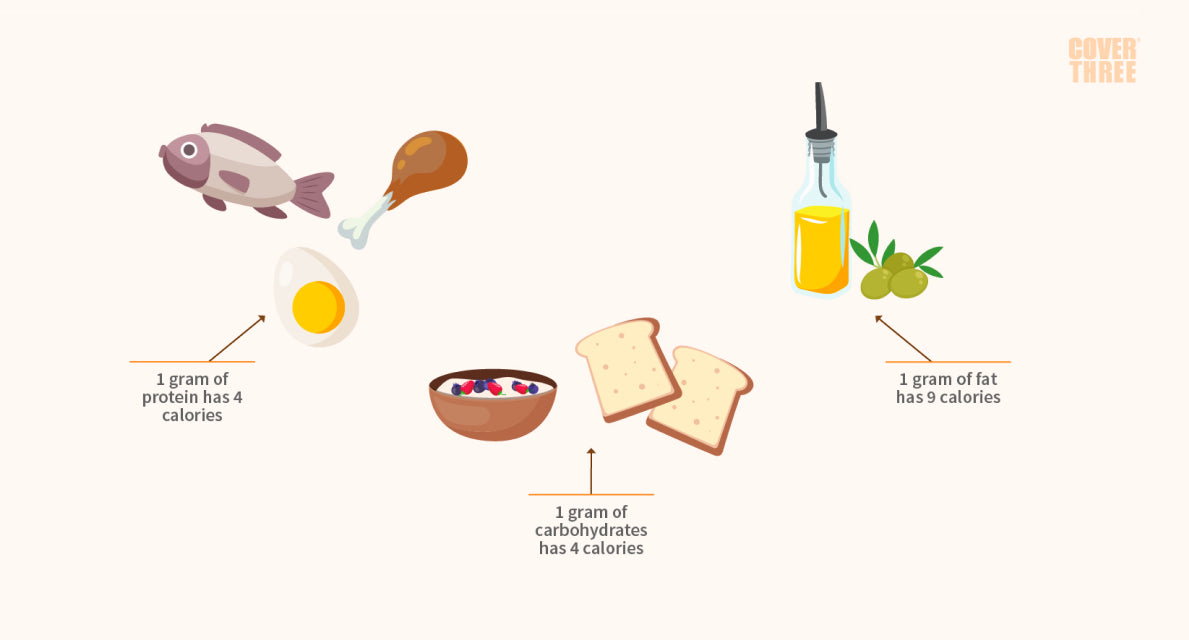
The Energy Content of Food
Nutrients Build Up the Neurons
Calories do not tell you the entire story. Recent evidence shows that the quality of food impacts health more than the amount taken.
For example, some nutrients do not only perk up the brain but also help form new neurons and protect other structures. Such nutrients make up a "high-quality diet." On the other hand, “low-quality foods" provide only calories and no other benefits. They may even release pro-inflammatory chemicals in the body.
The following nutrients are found in high-quality diets:
- Fats, especially omega-3 fatty acids like docosahexaenoic acid (DHA) and eicosapentaenoic acid (EPA), make up the brain's cell membranes. These substances speed up brain signals, boosting reflexes, memory retrieval, problem-solving and other mental tasks. DHA and EPA are essential fatty acids. The body does not make them, so they have to be obtained from the diet.
- Carbohydrates and proteins are the building blocks of many structures inside and outside of the brain cells. High-quality carbohydrates come from whole grains. Meanwhile, high-quality proteins come from sources that have more essential fatty acids than non-essential ones.
- DNA and RNA are needed for new brain cell formation. They also initiate the production of hormones and brain-signaling chemicals called "neurotransmitters." Uridine, obtained from dark green vegetables, is a component of RNA. Thymidine, a DNA component, is derived from uridine.
- Vitamins, notably vitamins C and K, help build brain cells, support cells, blood vessels and connective tissues. Minerals like calcium, potassium, magnesium, etc. also aid in forming these structures.
- Curcumin stimulates the growth of new neurons, powering up the memory and focus. It promotes brain cell regrowth and plasticity after an injury.
The best brain diet combines all these nutrients as each has a unique role in maintaining health and peak performance.
Diet Dictates Mental Function
A healthy brain has all its parts working synergistically. Cells communicate like clockwork when neurotransmitters and hormones are in a perfect balance. These brain chemicals are made using different nutrients, too.
- Acetylcholine is derived from alpha-glycerophosphocholine, a substance found in high amounts in eggs and legumes. This neurotransmitter is involved in muscle movement, digestion, cardiovascular health, visual focus, maintaining wakefulness and many other functions. Its deficiency is responsible for most Alzheimer's disease symptoms. Acetylcholine imbalance gives rise to Parkinsonian involuntary movements.
- Dopamine, a hormone and neurotransmitter, is made from amino acids, which come from digested proteins. Curcumin stimulates its production. Dopamine enhances attention, movement control, reward-motivated behavior and mood. It is severely depleted in Parkinson's disease. Dopamine imbalance is implicated in depression and ADHD.
- Gamma-aminobutyric acid (GABA) is another neurotransmitter made from amino acids. It induces sleep and prevents overstimulation of the brain.
- Norepinephrine, another molecule that functions as a hormone and neurotransmitter, is made from amino acids through several vitamin-aided steps. It works like caffeine because it keeps you alert and focused. It also improves mood. Vitamin C, B vitamins and curcumin enhance its production.
- Serotonin is amino-acid-derived and helps elevate the mood. Serotonin deficiency is associated with depression. Curcumin increases brain serotonin levels.
- Brain neurotrophic-derived factor (BDNF) is a growth factor, a protein molecule that promotes brain cell resilience and regeneration. It enhances neuroplasticity and learning. Curcumin is a nutrient that can stimulate BDNF secretion.
Brain foods improve focus and mental performance because they are rich in high-quality nutrients that boost the above substances.
Good Food Protects the Brain from Disease
The best brain diet helps protect from illnesses that can drastically weaken mental performance. Uridine and B vitamins are crucial to immune function. Vitamin E, omega-3 fatty acids and trans-resveratrol trap free radicals and other toxic substances that can promote inflammation. Curcumin and vitamin C help combat both biological and chemical disease agents.
In contrast, the standard American diet lacks these important nutrients. It is also high in substances that introduce stress in the body and aggravate illness, particularly, saturated fats, trans fats, cholesterol, sodium and excess sugars.
Electrolyte and Fluid Balance Are Crucial to Mental Alertness and Focus
Proper nutrition and hydration maintain the smooth electrolyte flow in the neurons, which is also necessary for signal transmission. Electrolyte and fluid imbalances can compromise mental function and may be fatal in severe cases.

A brain-healthy diet lets you compete at the highest levels in any field.
As you can see, nutrition has multiple vital roles in the brain, so careful food selection is key to optimum mental performance. Sadly, many active people are so accustomed to the standard American diet, which contributes little to proper neuronal function and upkeep. If you're on this diet and feeling constantly stressed, depressed, and distracted, you might consider switching to a regimen that will nourish the brain back to health.
“When it comes to overall brain health, just adding certain supplements will sharpen your brain”
Bindya Gandhi, M.D
Integrative & Functional, Family Doc
What Is the Best Diet for Sharpening Mental Focus?
There is a growing body of evidence supporting the beneficial effects of the MIND diet on mental performance.
"MIND" stands for "Mediterranean-DASH Diet Intervention for Neurodegenerative Delay," while "DASH" is short for "Dietary Approaches to Stop Hypertension."
Both the Mediterranean and DASH regimens are consistent with the USDA and HHS' concept of a healthy eating pattern. A healthy eating pattern includes a wide variety of vegetables, fruits, grains, low-fat dairy, proteins and oils. It is also rich in potassium and low on sodium, added sugars and saturated and trans fats.
Studies show that people on a healthy eating pattern, such as the MIND diet, have laser-sharp focus, emotional and psychological balance and exceptional memory that can remain until well into the retirement years. Individuals with sustained focus achieve mental momentum that primes them for long runs of success in any endeavor.
In each food group recommended by the health experts, there are some with specific neurologic benefits and can, therefore, be truly called "brain foods."
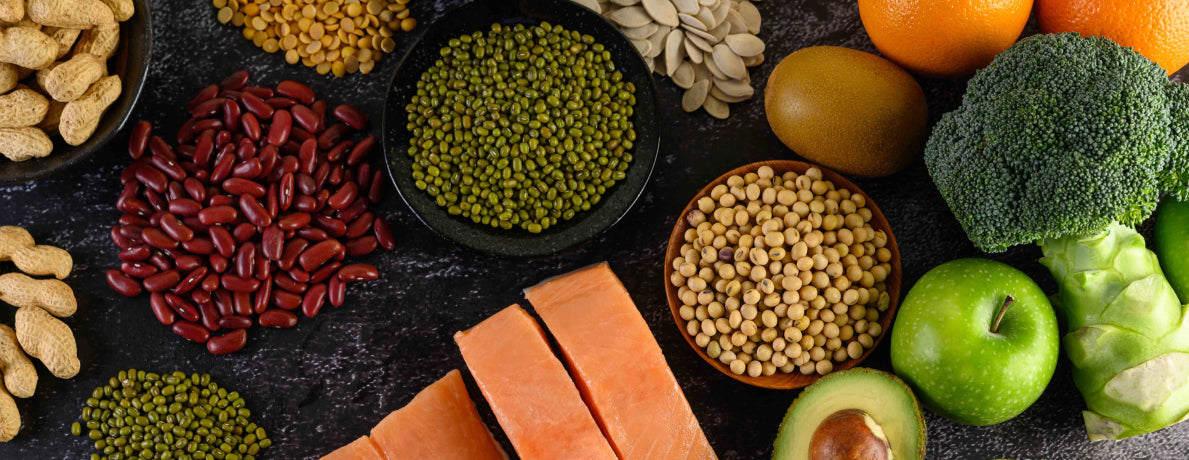
Vegetables:
Vegetables have high amounts of dietary fiber, vitamins, minerals and alpha-glycerophosphocholine. The brain foods in this group are broccoli, soybeans and turmeric.
- Broccoli is a dark green vegetable rich in vitamin K, which helps build brain fats, and uridine.
- Soybeans are legumes that have plenty of omega-3 fatty acids, antioxidants and minerals.
- Turmeric is a root vegetable that has high amounts of curcumin.
Fruits:
Fruits have lots of dietary fiber, vitamin C and potassium. The brain foods in this group are grapes, berries, oranges and cocoa.
- Grapes and berries are rich sources of the potent stilbenoid antioxidant trans-resveratrol. Red wine, one of the MIND diet's main components, is made from grapes.
- Oranges are rich in vitamin C.
- Cocoa is best taken as dark chocolate. It has caffeine, which boosts alertness and focus, and different types of flavonoid antioxidants.
Grains:
Aside from starch, which is a major carbohydrate source, grains have dietary fiber, minerals and vitamins. The best for the brain are whole grains like brown rice, oats and quinoa.
Active individuals may take refined grains as long as they are fortified with nutrients that are lost during processing. However, for better blood sugar control, whole grains must make up more than half of one’s daily carbohydrate intake.
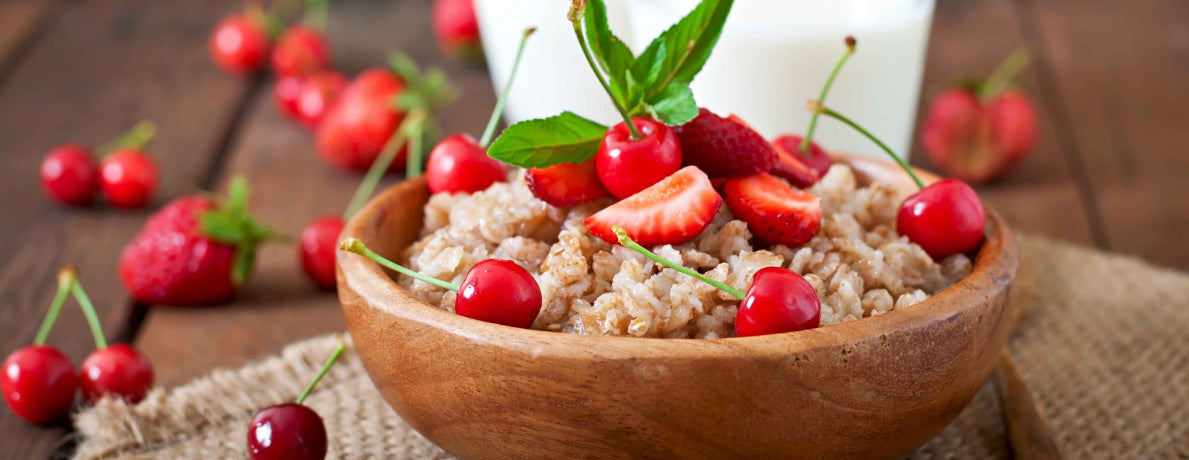
Low-fat dairy:
Low-fat dairy contains 1% fat or lower. This food group includes low-fat milk, yogurt and soymilk. The fats taken out during processing are mostly saturated types. Low-fat dairy is rich in carbohydrates, proteins, vitamins, minerals and alpha-glycerophosphocholine. Fortified milk and soymilk have high amounts of omega-3 oils.
Proteins:
Animal and plant proteins also have vitamins and minerals. The brain foods in this group are fatty fish, poultry meat, eggs, nuts and seeds.
- Fatty fish are rich sources of DHA, EPA, iron and vitamins B12 and D. This group includes salmon, anchovies, herring, sardines and trout. Some fatty fish have high levels of mercury, which can impair mental performance, among many things. This is due to their exposure to contaminated water present in some geographic areas. They include bluefish, some tuna species, shark, king mackerel, etc. They are better avoided or taken in reduced quantities.
- Poultry meat is high in niacin (vitamin B3) and iron. Eggs are rich in alpha-glycerophosphocholine.
- Nuts and seeds are rich in vitamin E and omega-3 oils. Nuts include walnuts and butternuts. Seeds include chia and flax seeds.
6 Oils:
Oils are fats with large amounts of monounsaturated and polyunsaturated fatty acids, which make them liquid at room temperature. The brain foods in this group are flaxseed, soybean, and canola oils, which are rich in omega-3 fatty acids and low on saturated fats. Olive oil, which is mostly composed of monounsaturated fats, is a MIND diet mainstay.
A diet containing all these food groups will help you enhance your mental focus, stay within a healthy weight range and avoid nutritional deficiencies.
Make sure you give your brain the best food
Help your brain get what it needs to flourish, every day.
“One of the best things I noticed about Cover Three was after taking the products for a couple weeks, I really started to notice that I had this mental momentum”
Sabrina Ponte
Miss America Org
What Foods Can Make the Brain Sluggish?
For cardiovascular and mental health, nutrition experts advise limiting the intake of the following dietary components:
Added (simple) sugars:
Simple sugars are present in abundant amounts in sweetened beverages, pastries, creams, candies, etc. It can cause blood glucose spikes—what we call "the sugar high"—which give the body and brain a huge but transient energy boost.
In normal young individuals, insulin clears excess glucose within two hours of eating, leading to an equally abrupt decrease in energy and mental alertness. Over time, however, chronic excess glucose intake will make it difficult for your body to normalize your blood glucose levels.
Persistently high blood sugar can kill off your neurons, damage your heart and blood vessels, weaken your immune system and produce other complications. Cognitive decline and other signs of nerve impairment can manifest early in life.
The recommended daily limit for added sugars is 10% of the total calories consumed. In a 2,000-calorie diet, this is equivalent to about 12 teaspoons of sugar. For your reference, a 12-ounce can of Coca-Cola has about 10 teaspoons of sugar.
Refined carbohydrates:
Refined carbohydrates are processed whole grains. Unless fortified, they lose most of the good nutrients during processing. Even if they are fortified, one thing about them is that they can cause blood glucose spikes, just like simple sugars.
Sources of refined carbohydrates include white bread, white rice, pastries and breakfast cereals. Individuals who have them in their diet must replace at least half of their daily intake with whole grains.
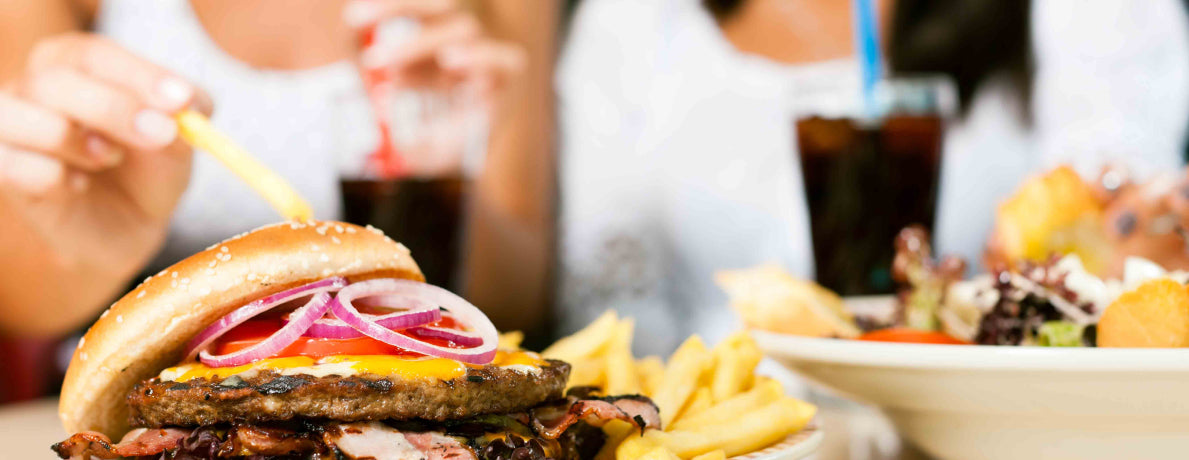
A diet high in added sugars, refined carbohydrates, saturated fats, trans fats, cholesterol and sodium can severely limit your mental and physical performance over time. Chronically high blood sugar and its widespread complications can all lead to early-onset neurologic decline.
Saturated fats, trans fats and cholesterol:
The human body makes saturated fats and cholesterol abundantly as they are important for structural maintenance and energy production. They are, therefore, non-essential fats. However, the standard American diet increases their levels beyond what is needed for normal function. They do not only make you overweight and easily fatigued but also keep you from reaching your peak mental performance.
Saturated and trans fats are found in fatty red meat, whole milk, margarine, butter, cream cheese, processed foods and fast food. Unlike oils, they become solid at normal temperatures. In the brain, they can make cell membranes less fluid, making neuronal communication difficult. They can also induce inflammation and reduce blood flow, which can harm the brain and diminish your mental focus.
Cholesterol is a vital component of cell membranes and hormones, but the body can create its own supply. Dietary cholesterol adds to it unnecessarily. Excess deposits of this fatty substance in the blood vessels reduce blood flow, trigger inflammation and weaken the neurons.
The recommended daily limit for saturated fats is 10% of the total calories taken. The USDA does not set upper limits for trans fats and cholesterol but recommends that they must be avoided as much as possible. As a rule, most foods high in saturated fats also have plenty of trans fats and cholesterol.
Salt:
The standard American diet contains a lot of salt, and therefore, sodium. Some canned vegetables and meat also have high salt content.
This electrolyte is needed for normal function, including mental tasks. However, excessive amounts can produce conditions that suffocate the brain and accelerate cognitive decline.
The recommended daily limit for sodium intake is 2,300 mg. This is equivalent to about one teaspoon of table salt.
Alcohol:
Too much alcohol can compromise mental performance, and chronically high levels can mess up the brain. Excessive drinking during pregnancy can harm the growing fetus. And we all know why drunk driving is never a good idea.
The USDA recommends limiting alcohol intake to one drink a day for women and two for men. One drink has 0.6 fluid ounces of pure alcohol, which is equivalent to 12 fl. oz. of regular beer, 5 fl. oz. of wine or 1.5 fl. oz. of 80-proof distilled spirits.
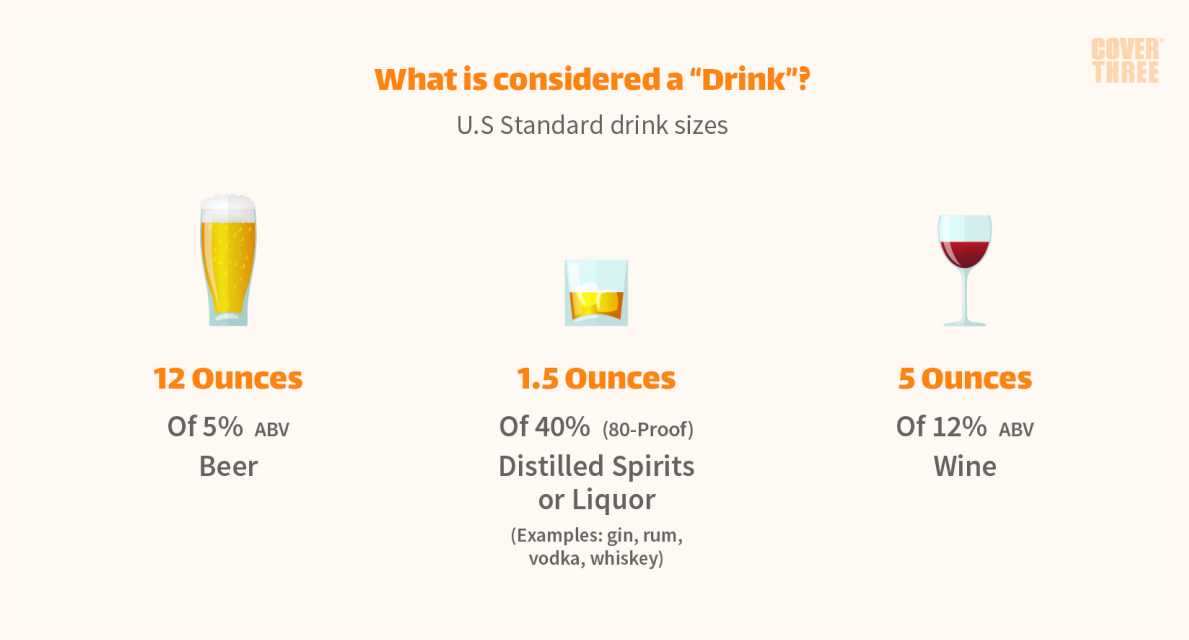
The MIND diet includes moderate red wine intake, but this is more for the beverage's antioxidant properties and not its alcohol content. People who prefer to have red wine in their regimen can have one glass a day. There is no recommendation that those who are not taking alcohol should start doing it. They can get the brain booster trans-resveratrol from other foods and supplements.
Except for alcohol, these substances are the principal components of the standard American diet. That is why there has been a steep rise in neurological and mental health issues in the last few decades. However, limiting their intake has been shown to enhance mental focus, delay cognitive decline and maintain psychological well-being.
How Should You Make A Brain Food Diet Plan?
A proven nutritional strategy for improving brain health is the MIND diet plan.
The MIND diet includes the following:
- Dark green vegetables—at least 6 servings a week
- Other vegetables—at least 1 serving a day
- Nuts—5 servings a week
- Berries—at least 2 servings a week
- Beans—at least 3 servings a week
- Whole grains—at least 3 servings a day
- Fish—1 serving a week
- Poultry—2 servings a week
- Olive oil—regular use
- Red wine—once a day, but not mandatory
Meanwhile, it also has the following restrictions:
- Red meat—no more than 4 servings a week
- Butter and margarine—no more than 1 tablespoon daily
- Cheese—no more than 1 serving a week
- Pastries and sweets—no more than 5 servings a week
- Fast food—no more than 1 serving a week
For a 2,000-calorie daily diet, a sample 3-day meal plan can look like this:
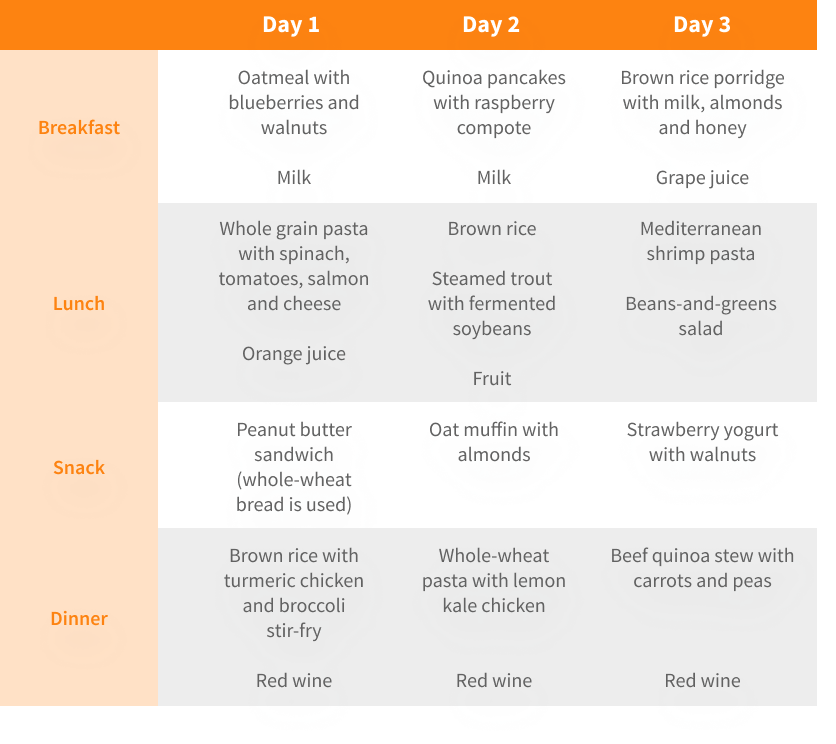
These meals require short preparation time. However, if you are too busy to cook but want to ensure that your neurons stay healthy, there's always doctor-formulated Brain Assist.
Brain Assist has six of the most powerful brain boosters known: alpha-glycerophosphocholine, curcumin, omega-3 fatty acids, trans-resveratrol, uridine and vitamin C. One pack of this delicious smoothie is enough to keep you focused throughout the day, ready to build mental momentum.
What Else Can Boost Mental Performance Besides the Best Brain Diet?
You may be tired of hearing it from the health buffs, and yet they're right. Studies show that consistent brain training and physical activity can also perk up the brain. When combined with a brain-healthy diet, they can improve mental performance and help stave off cognitive decline.
Brain games involve repeating various perceptual and cognitive tasks over extended periods. Playing fast-paced video games has been associated with better vision, attention, processing speed and decision-making skills among young adults. Engagement in commercially available computerized cognitive games has been found to improve mental function in older individuals.
Meanwhile, physical exercise is known to induce BDNF. This growth factor stimulates brain cell regeneration in the hippocampus, the center of memory and learning. Regular physical activity is known to help older individuals stay sharp and focused.
Other ways that can safely and effectively boost your mental focus are sleep, stress reduction and minimizing toxic exposures.
Conclusion
The best brain diet provides energy, enhances neuronal resilience and growth, promotes proper function, fights disease and ensures electrolyte balance. The standard American diet lacks most of these qualities, so it does not contribute much to brain health.
On the other hand, a healthy eating pattern, such as the MIND diet, has a combination of powerful brain boosters that help keep the mind sharp for a very long time. Sustained focus builds mental momentum, a major determinant of lifelong success. Therefore, active individuals who want to stay at peak performance levels should switch to such a regimen.

